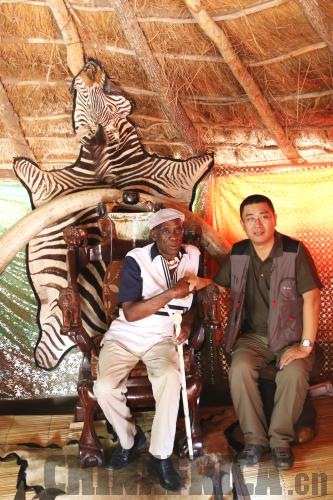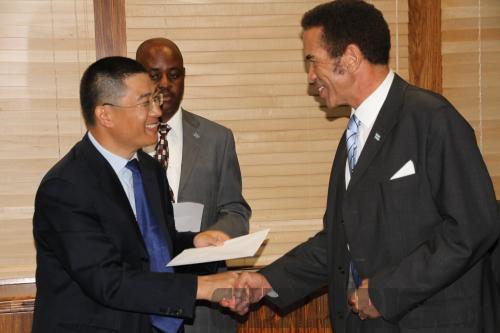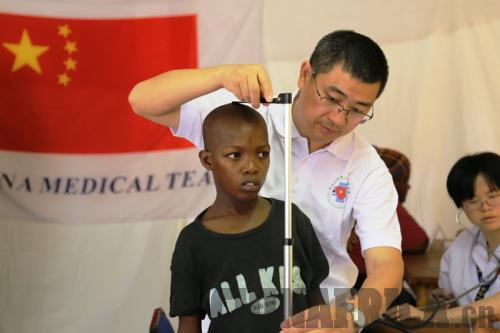| 
Miles Nan and Zambia Senior Chief Mukuni
When Miles Nan arrived in Botswana in 1998, he felt homesick. There would be no news of his homeland for long periods and unable to follow the local language, the Chinese businessman could not follow the local news either and worse still, the laws. His predicament was shared by the small Chinese community of "new immigrants" living in Botswana, who had moved there in the 1980s and 1990s, embracing Africa to explore business opportunities. Like Nan, they all faced problems in their daily lives while trying to adapt to the local environment and follow the local rules and regulations.
Some had a brush with the local law. Nan thought it was unfair to blame them since they broke the law not intentionally but unwittingly, due to unfamiliarity with it. So about a year after his arrival he decided to do something about it. He decided to bring out a newspaper in Chinese to help the Chinese in Africa hear the voice of China as well as the voice of Africa.
"I hoped the newspaper would be a good bridge between the Chinese in Africa and their motherland, and also a window for them to see the world and the local society," the 45-year-old, President of Mileage, a company involved in engineering and mining projects, told ChinAfrica.

Seretse Khama, President of Botswana, meets with Miles Nan
Bitter hardships
Amid "bitter hardships," Nan started the first Chinese newspaper in Botswana. "There was no formal news agency at that time," he recalled. He had to write his articles by hand first, then key them in on a computer, make copies of the pages and bind them by hand, page by page. Every day, Nan printed 500 copies of the daily and distributed them among the local Chinese for free.
The black and white crudely produced daily, which looked more like a booklet than a newspaper, created a sensation in the local Chinese community and quickly became a platform for the immigrants to know more about their local society. Though Nan had not received any journalistic training, he was a journalist at heart, with a passion for news and a strong sense of social responsibility.
After the launch, Nan thought the one-man daily would not be able to meet the requirements of the growing Chinese diaspora anymore. So he decided to do it professionally by recruiting journalists, photographers, designers and other personnel. Besides local news, he added international news reports and improved the print quality.
The revamped The Oriental Post was launched in capital city Gaborone on May 29, 2009. However, all this, while greatly improving the reputation of the daily, also meant a larger investment and more problems for Nan.
Personnel recruitment was the first obstacle. According to Nan, it is easier to run a newspaper in developed countries such as the United Kingdom and the United States, which have a large number of Chinese students. In Africa, the number of Chinese students is very limited and getting a visa is difficult in some countries.
Then there was the financial aspect. While labor and printing costs were high, the revenue coming in from advertisements was low and it was difficult to make both ends meet. Nan had to support the newspaper with the revenue generated from his business.
What made him persist in the face of so many challenges? It was a labor of love. "I'm not in it for money," he said passionately. "I run the paper despite so many difficulties because my dream is to be a newsman. I hope to distribute the paper to every corner of Africa in the future."
The Oriental Post is still distributed to the local Chinese for free. Currently there are over 10,000 Chinese living in Botswana, running small businesses or working in the construction and service industries.

Miles Nan measures an African orphan's height
Power of dream
All's well that ends well. Nan's efforts and perseverance have borne fruit. Today, The Oriental Post has edged itself into the mainstream media in Botswana. It has expanded in Southern Africa with a branch in Zambia and is also begun publishing in East Africa's Tanzania. The newspaper currently has 200,000 Chinese readers in Africa.
The growth of The Oriental Post has caught the attention of the local government. Journalists of The Oriental Post are invited to media events together with the local mainstream media. It has become an important channel for the local government to disseminate information among the Chinese.
On the fifth anniversary of The Oriental Post, Jeff Ramsay, Deputy Permanent Secretary for Media at the Botswana's Ministry of Communications, Science and Technology, paid a tribute to the daily, saying it had promoted cooperation between China and Africa in trade and economy, and played a major role in key China-Africa issues.
Nan, who also chairs the Charity Association of Chinese in Botswana, wants more local Chinese to be engaged in philanthropy, giving back to society and thereby improving the locals' perception of Chinese. His newspaper hosts a golf charity tourney in Botswana with the proceeds from it going to help the disadvantaged locals. The daily also organizes interactions among Chinese and African children and exchange activities to promote cultural awareness and friendship between China and Africa.
All this keeps him going. That's why in spite of the difficulties and pressure he faces from time to time, Nan doesn't plan to give up his dream of running a Chinese newspaper in Africa. "It is just like my child," he said. "I witnessed its birth and growth. It will grow into a towering tree one day." |